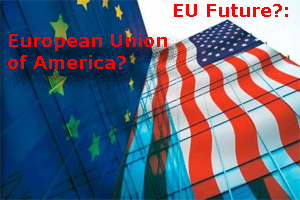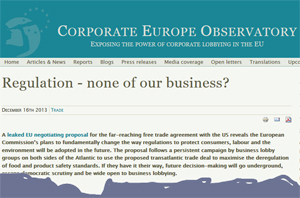As previously reported by this website, the secret Transatlantic Trade and Investment Partnership (TTIP) negotiations are near completion, and if agreed upon; all European health and safety laws and the democratic government’s decision making will be compromised by an agreement which gives business the power to sue government’s in the event any of their laws have a detrimental impact upon profit margins!
 Further it will place not only health and safety legislation at risk, but also the ability of EU countries such as the UK, to limit the take-over of healthcare provision by US private healthcare companies; which is having such a huge impact upon the delivery of NHS healthcare services already.
Further it will place not only health and safety legislation at risk, but also the ability of EU countries such as the UK, to limit the take-over of healthcare provision by US private healthcare companies; which is having such a huge impact upon the delivery of NHS healthcare services already.
Now, finally, the proposed trade agreement is being given public scrutiny for the first time, following the leaking of a EU negotiation proposal for the EU-US trade agreement.
The leaked document reveals the European Commission's plans to fundamentally change the way regulations will be adopted in the future. Such reforms, if adopted, could seriously undermine existing EU rules on food safety, consumer protection, the environment, health and safety; and many other areas as the proposals give new powers to business to call a halt to proposed legislation which conflicts with their interests, or to re-negotiate existing regulations.
As the third round of negotiations for a Transatlantic Trade and Investment Partnership (TTIP) begins today in Washington (US), the leaked document, intended for today's meeting, shows the details of so-called “regulatory cooperation” to be included in the deal.
A report published yesterday 16th December, by watchdog Corporate Europe Observatory, and entitled “Regulation - none of our business?” exposes the leaked Commission document and how it proposes to set up a “Regulatory Cooperation Council” which would assess existing and future regulations on both sides of the Atlantic to ensure that they are 'compatible' and do not undermine business interests.
This means that Business will be involved from the beginning of the process, well before any public and democratic debate takes place, and will have excellent opportunities to oppose important initiatives to improve food standards, environmental standards, and health and safety legislation or protect consumers.
The report provides details of some of the worst aspects of the proposed deal, including the establishment of a permanent EU-US dialogue to work towards mutually acceptable standards, and a procedure where a comprehensive system of consultation would be triggered if new regulation is proposed, or if regulation already in place has a “significant” impact on trade.
The proposal by the two corporate lobby groups contains the following main elements:
- Business should have the right to be involved in the first stage when new regulation is prepared. And let us remember that when we are talking about regulation we mean rules intended to prevent the food industry from marketing foodstuffs which include dangerous substances, or to keep energy companies from destroying the climate, or regulations to combat pollution and to protect consumers.
- New regulations should be investigated via a “regulatory compatibility analysis” (RCA). During this investigation, seven questions would have to be answered. The questions are clearly tilted towards the interests of business, as they are mainly about the impact on business and on trade, including what the costs or savings would be to the private sector, how much regulatory authorities would “save” by down-scaling measures, and whether measures are outdated and should thus be eliminated or modernised. In other words, a business-friendly agenda is to constitute the backbone of regulatory assessments, if the business lobby has it its way.
- Regulatory cooperation should address not only new regulation, but existing regulation as well. Certain circumstances should trigger a formal procedure to deal with inconsistencies' (significant impact on trade, impact on an existing agreement on regulation, regulation in an area with a great potential).
- Regulatory agencies should have a key role. With the close cooperation established between business and regulatory agencies on both sides, this would help ensure stronger business impact.
- The overall responsibility for regulatory cooperation is to be trusted to an “oversight group” (sometimes called a Regulatory Cooperation Council) whose obligations are spelled out in the proposal, and which include to work “with stakeholders to ensure they are engaged at regular intervals during a RCA”. Also, provisions on “transparency” and “stakeholder engagement guidelines” would make sure the business community can stay involved in all relevant procedures.
BusinessEurope and the US Chamber of Commerce take care to stress that this system of regulatory cooperation cannot “undermine the sovereign right to regulate or force the hand of regulators”. But the authority of regulators is to be confined to a “veto authority” to reject an individual product from the scope of an equivalence/cooperation agreement, indicating the lobby groups' high ambitions for regulatory cooperation. It is to be a largely autonomous process, removed from parliamentary oversight and open democratic debate.
The author of the report, CEO researcher Kenneth Haar said:
“This model put the business groups at the table with regulators to essentially co-write legislation. Existing and future EU regulation would have to go through onerous procedures and lengthy negotiations with a strong business presence, in a way that would be likely to avoid any meaningful democratic debate. And the odds are that it will result in a major deregulation offensive.”
 CEO's report shows how the proposal by the Commission clearly demonstrates the access and influence enjoyed by US corporate lobbyists. It demonstrates how the European Commission has already had discussions on these specific proposals with business lobby groups, and it reveals how the Commission's position is remarkably similar to a proposal put forward by BusinessEurope and the US Chamber of Commerce.
CEO's report shows how the proposal by the Commission clearly demonstrates the access and influence enjoyed by US corporate lobbyists. It demonstrates how the European Commission has already had discussions on these specific proposals with business lobby groups, and it reveals how the Commission's position is remarkably similar to a proposal put forward by BusinessEurope and the US Chamber of Commerce.
Kenneth Haar said:
“Public outcry shows it might be not possible for EU trade negotiators to brush-off public concern over US-origin GMOs (genetically modified organisms), chlorinated chickens or hormone beef. But even if these products are not included in the negotiation phase of the deal, they could easily be allowed in the long term via this system of regulatory cooperation. If adopted, this proposal will be a huge victory for corporate lobbying on both sides of the Atlantic.”
The proposal by the European Commission suggests a rather complex and lengthy procedure, where business will be awarded rights to demand information and to be part of negotiations on regulatory measures. The system includes an early warning mechanism to allow industry lobby groups to react promptly to proposed regulation, as well as surveillance of EU member states' new regulations to ensure that they comply with the pro-business objectives of TTIP.
The report warns that this proposal could result in the Commission refraining from even tabling proposals for new regulations in the future if they fear opposition by US authorities or business lobbies.
Read the full report: click on the pic above.
Source: Corporate Europe Observatory